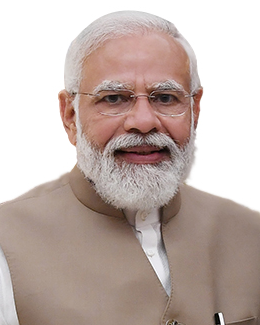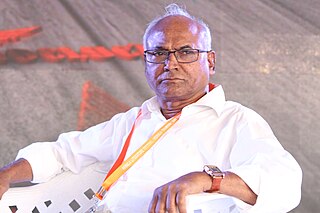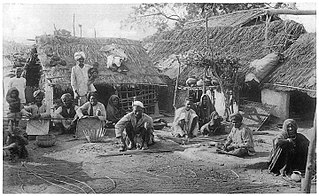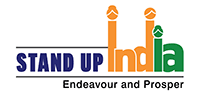Related Research Articles

Narendra Damodardas Modi is an Indian politician who has served as the 14th prime minister of India since May 2014. Modi was the chief minister of Gujarat from 2001 to 2014 and is the Member of Parliament (MP) for Varanasi. He is a member of the Bharatiya Janata Party (BJP) and of the Rashtriya Swayamsevak Sangh (RSS), a right wing Hindu nationalist paramilitary volunteer organisation. He is the longest-serving prime minister from outside the Indian National Congress.

Dalit, also some of them previously known as untouchables, is the lowest stratum of the castes in the Indian subcontinent. Dalits were excluded from the fourfold varna of the caste hierarchy and were seen as forming a fifth varna, also known by the name of Panchama. Several scholars have drawn parallels between Dalits and the Burakumin of Japan, the Baekjeong of Korea and the peasant class of the medieval European feudal system.

Kancha Ilaiah Shepherd is an Indian political theorist, writer and a Dalit rights activist. He writes in both English and Telugu languages. His main domain of study and activism is the annihilation of caste.

Madiga is a Telugu caste from southern India. They mainly live in the states of Andhra Pradesh, Telangana and Karnataka, with a small minority in Tamil Nadu. Madigas are historically associated with the work of tannery, leatherwork and small handicrafts. Today, most are agricultural labourers. They are categorized as a Scheduled Caste by the Government of India. Within the Madiga community, there are various sub-castes include Bindla, Chindu, Dakkali and Mashti. Madigas have their own classes, the priestly class is known as Madiga Dasari. The Sangaris, Thothis, etc. have different works for their community.
The caste system among South Asian Christians often reflects stratification by sect, location, and the caste of their predecessors. There exists evidence to show that Christian individuals have mobility within their respective castes. But, in some cases, social inertia caused by their old traditions and biases against other castes remain, causing caste system to persist among South Asian Christians, to some extent. Christian priests, nuns, Dalits and similar groups are found in India, Pakistan, Bangladesh, and Nepal.
National Commission for Religious and Linguistic Minorities, also called Ranganath Misra Commission, was constituted by Government of India on 29 October 2004 to look into various issues related to Linguistic and Religious minorities in India. It was chaired by former Chief Justice of India Justice Ranganath Misra. The commission submitted the report to the Government on 21 May 2007.

Erode Venkatappa Ramasamy, revered by his followers as Periyar or Thanthai Periyar, was an Indian social activist and politician who started the Self-Respect Movement and Dravidar Kazhagam. He is known as the 'Father of the Dravidian movement'. He rebelled against Brahmin dominance and gender and caste inequality in Tamil Nadu. Since 2021, the Indian state of Tamil Nadu celebrates his birth anniversary as 'Social Justice Day'.

The Thakor Koli, or Thakore Koli, is a subcaste of the Koli caste of Gujarat. Koli people form the largest caste-cluster in Gujarat, comprising 24 per cent of the total population of the state. Koli Thakors in Gujarat are classified as Other Backward Class (OBC). During his tenure, the former chief minister, Koli community member Madhav Singh Solanki, included all Koli communities of Gujarat in the OBC. Koli Thakors are mostly cultivators or small land-owners.
The Self-Respect Movement is a popular human rights movement originating in South India aimed at achieving social equality for those oppressed by the Indian caste system, advocating for lower castes to develop self-respect. It was founded in 1925 by S. Ramanathan who invited E. V. Ramasamy to head the movement in Tamil Nadu, India against Brahminism. The movement was extremely influential not just in Tamil Nadu, but also overseas in countries with large Tamil populations, such as Sri Lanka, Burma, Malaysia and Singapore. Among Singapore Indians, groups like the Tamil Reform Association, and leaders such as Thamizhavel G. Sarangapani were prominent in promoting the principles of the Self-Respect Movement among the local Tamil population through schools and publications.

Achieving Universal Health Care has been a key goal of the Indian Government since the Constitution was drafted. The Government has since launched several programs and policies to realize ‘Health for All’ in the nation. These measures are in line with the sustainable development goals set by the United Nations. Health disparities generated through the Hindu caste system have been a major roadblock in realizing these goals. The Dalit (untouchables) community occupies the lowest stratum of the Hindu caste system. Historically, they have performed menial jobs like - manual scavenging, skinning animal hide, and sanitation. The Indian constitution officially recognizes the Dalit community as ‘Scheduled Castes’ and bans caste-based discrimination of any form. However, caste and its far-reaching effects are still prominent in several domains including healthcare. Dalits and Adivasis have the lowest healthcare utilization and outcome percentage. Their living conditions and occupations put them at high risk for disease exposure. This, clubbed with discrimination from healthcare workers and lack of awareness makes them the most disadvantaged groups in society.

Ram Shankar Katheria, is an Indian politician and former Chairman of the National Commission for Scheduled Castes. He is a member of the 17th Lok Sabha of India representing Etawah constituency of Uttar Pradesh. He represented the Agra constituency of Uttar Pradesh previously. He is a member of the Bharatiya Janata Party. He was a Minister of State in the Human Resource Development Ministry till 6 July 2016.

Keshav Prasad Maurya is an Indian politician, currently serving as the Deputy Chief Minister of Uttar Pradesh. He is a member of the Bharatiya Janata Party. Maurya was associated with a right-wing Hindu organization Rashtriya Swayamsevak Sangh, before entering active politics through BJP. He was also involved in cow protectionism in his early life. Before 2017 Uttar Pradesh Legislative Assembly elections, he was made state president of the BJP, and after the victory of BJP, he was appointed as Deputy Chief Minister of Uttar Pradesh in the first Yogi Adityanath Government. Maurya again contested the legislative assembly elections in 2022 from Sirathu Assembly constituency, losing to Pallavi Patel of Samajwadi Party. However, he was given a second term as Deputy CM in the second Yogi Adityanath government.

Swachh Bharat Mission, Swachh Bharat Abhiyan, or Clean India Mission is a country-wide campaign initiated by the Government of India on 2 October 2014 to eliminate open defecation and improve solid waste management and to create Open Defecation Free (ODF) villages. The program also aims to increase awareness of menstrual health management. It is a restructured version of the Nirmal Bharat Abhiyan which was launched by Congress in 2009 that failed to achieve its intended targets due to rampant corruption and indecisive leadership.

The Legislative Assembly election was held over five phases in Bihar through October–November 2015 before the end of the tenure of the prior Legislative Assembly of Bihar on 29 November 2015.

Stand-Up India was launched by the Government of India on 5 April 2016 to support entrepreneurship among women and SC & ST communities. Stand Up India Loan Scheme is a government initiative launched by the Government of India in 2016 to promote entrepreneurship and facilitate bank loans to Scheduled Caste (SC) / Scheduled Tribe (ST) and women entrepreneurs in the country. The scheme aims to provide loans between Rs.10 lakhs and Rs.1 crore for setting up a greenfield enterprise in manufacturing, trading or services sector.

The 14th Gujarat Legislative Assembly election, 2017 was held on 9 December 2017 and 14 December 2017 in the Indian state of Gujarat to elect the Members of Legislative Assembly (MLA). The votes were counted on 18 December. All 182 members of the 14th Gujarat Legislative Assembly were elected with the leader of the largest party or coalition expected to become the next chief minister.

The premiership of Narendra Modi began on 26 May 2014 with his swearing-in as the Prime Minister of India at the Rashtrapati Bhavan. He became the 14th Prime Minister of India, succeeding Manmohan Singh of the Indian National Congress. Modi's first cabinet consisted of 45 ministers, 25 fewer than the previous United Progressive Alliance government. 21 ministers were added to the council of ministers on 9 November 2014.
Kausalya is a prominent Indian anti-caste activist. She became a cause célèbre after her former husband V. Shankar was hacked to death in 2016 in an honour killing by killers hired by her family. Her case, known as Udumalai Shankar murder case, became emblematic of the endemic issue of honour killings of inter-caste couples, as well as the enduring issues of caste violence in Tamil Nadu. Her family were opposed to her inter-caste marriage. She is a Thevar, while Shankar belonged to the Pallar caste. On 9 December 2018, she wedded Mr. Sakthi in Coimbatore. Her decision to get remarried was received well with wishes pouring in from many sections.

Inter-caste marriage is a type of marriage that is done outside of one's caste. Nepal has many castes and inter-caste marriage is generally considered taboo. However, this kind of marriage has been gradually gaining acceptance.
Intercaste marriage (ICM), also known as marrying out of caste, is a form of exogamous nuptial union that involve two individuals belonging to different castes. Intercaste marriages are particularly perceived as socially unacceptable and taboo in most parts of South Asia.
References
- 1 2 Tish Sanghera (22 October 2020). "Inter-caste marriages depend on education level, but not that of the couple". Business Standard. Retrieved 19 October 2020.
- ↑ thehindu.com: 'Caste no bar', in words if not in action
- 1 2 "Modi government push for inter-caste marriages; offers Rs 2.5 lakh for marrying Dalit". Financial Express. 6 December 2017. Retrieved 19 October 2020.
- ↑ "Love in the time of caste". The Hindu. 27 July 2013. ISSN 0971-751X . Retrieved 6 November 2015.
- ↑ Anita Diehl. (1977). E. V. Ramaswami Periyar. A study of the influence of a personality in contemporary South India, Scandinavian University Books: Sweden. ISBN 91-24-27645-6.
- ↑ bbc.com: India: Cash reward offered for inter-caste marriages
- ↑ "Lawyer's Collective". Archived from the original on 10 September 2015.
- ↑ "Infochange India". Archived from the original on 2 October 2017.
{{cite web}}: CS1 maint: unfit URL (link) - ↑ Prachi Salve and Saumya Tewari (11 May 2016). "Mizoram Has Highest Number of Inter-Caste Marriages in India With 55%". The Wire. Retrieved 4 November 2020.
- ↑ ARKA ROY CHAUDHURI, TRIDIP RAY and KOMAL SAHAI (20 October 2020). "Chances of an inter-caste marriage go up if groom's mother is educated, study" . Retrieved 20 October 2020.
- ↑ Tandon, Aditi (5 July 2010). "Inter-caste ties behind most honour crimes. Just 3% cases due to same gotra marriages, says new survey". The Tribune (India) . Retrieved 14 February 2015.